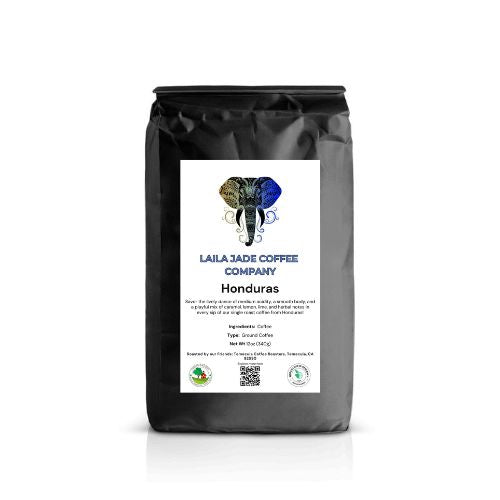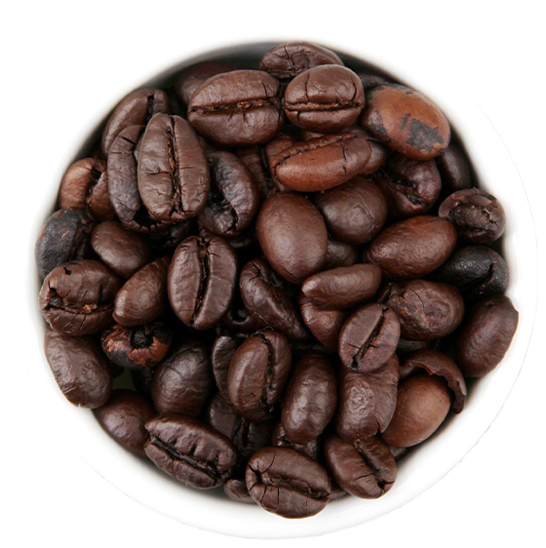Honduras
Embark on a sensory journey with our single origin coffee from Honduras, where each cup encapsulates the essence of this lush, vibrant region. Our carefully selected beans promise an exceptional coffee experience that will tantalize your taste buds and leave you craving more.
With medium acidity, our Honduras coffee offers a balanced and harmonious flavor profile, delivering a gentle yet invigorating kick that awakens your senses. The smooth body provides a rich and velvety mouthfeel, ensuring a luxurious coffee experience from start to finish.
Indulge in the delightful notes of caramel, which add a layer of sweetness and depth to every sip. The zesty hints of lemon and lime infuse the coffee with a refreshing brightness, creating a perfect harmony with the caramel undertones. Herbal notes weave through the flavor profile, adding a unique and aromatic twist that enhances the coffee's complexity.
Whether you’re starting your day or enjoying a relaxing moment, our Honduras single origin coffee is the perfect companion, offering a symphony of flavors that captivate and delight. Experience the exquisite balance of medium acidity, a smooth body, and the enchanting blend of caramel, lemon, lime, and herbal notes in every cup.
Medium-Dark Roast
Couldn't load pickup availability


USP
Brew excellence at home with Laila Jade Coffee, where every bean is a pledge to purity and sustainability. As a family-owned and service-connected disabled veteran owned business, we offer roast to order, specialty-grade, organic, and Fair Trade Certified coffees shipped directly to your door. Proud supporters of World Coffee Research and Trees for Education, every purchase helps nurture both the planet and our future.

Roast Body

Medium-Dark Roast
A coffee's roast level significantly affects flavor profile. Light roasts offer bright acidity and preserve the bean’s original fruity or floral notes. Medium roasts balance flavor and body, emphasizing caramel-like characteristics. Medium-dark roasts introduce bolder, spicier flavors with a touch of smokiness. Dark roasts deliver the most intense flavors with notable smoky and chocolate tones, reducing acidity.
Processing
A coffee’s process describes how the seed is separated from the coffee cherry. Popular methods include washed, dry, and honey, but there are many other processes that put special emphasis on different aspects of these methods.
100% ARABICA COFFEE,SOURCED RESPONSIBLY,ROASTED CAREFULLY.
When you savor a cup of our 100% Arabica coffee, you’re experiencing more than just a beverage. Our commitment to quality starts with sourcing beans from the world’s finest coffee-growing regions, where the climate, soil, and altitude come together to produce exceptional Arabica coffee. Arabica beans are celebrated for their smooth, nuanced flavor profiles, ranging from sweet and fruity to rich and chocolatey, with lower bitterness compared to other coffee varieties. This attention to quality continues through our meticulous roasting process, where each batch is carefully crafted to bring out the beans' unique characteristics, ensuring a balanced and flavorful cup every time.
Frequently asked questions
What makes Honduran coffee unique?
Honduran coffee is unique due to its diverse flavor profiles that vary significantly across its regions, largely influenced by the country's varied microclimates and altitudes. Known for its smoothness and balance, Honduran coffee often features a sweet, mild taste with notable notes of chocolate, caramel, and tropical fruits, making it exceptionally approachable. The country's coffee has also gained recognition for its potential in producing high-quality beans akin to those from its more famous neighbors like Guatemala and Costa Rica, thanks to improvements in farming techniques and processing methods. As a result, Honduran coffee offers a rich spectrum of tastes that can appeal to a wide range of palates, making it increasingly popular on the international coffee scene.
Which areas of Honduras are known for producing high-quality coffee?
Honduras is celebrated for its diverse coffee-producing regions, each known for unique flavor profiles. Copán, near the Guatemalan border, is famed for its sweet, chocolatey coffee with hints of tobacco. Montecillos stands out for its bright acidity and complex floral and citrus notes, while Comayagua offers coffees with sweet, fruity flavors and a balanced body. Additional regions like Agalta and El Paraíso are recognized for their nutty, fruity qualities and consistent quality, respectively, all benefiting from the country's ideal coffee-growing climates and high altitudes.
Can I use Honduran coffee beans for different brewing methods?
Yes, Honduran coffee beans are highly versatile and can be used effectively across a variety of brewing methods due to their balanced flavor profiles. Whether you prefer espresso, which can highlight their rich, chocolatey notes, or pour-over, which enhances their subtle fruity and floral nuances, Honduran beans adapt well. They also perform excellently in drip coffee makers and French presses, where the inherent sweetness and smooth body of the beans can be fully appreciated. This adaptability makes Honduran coffee a popular choice for coffee enthusiasts looking to explore different flavors and brewing techniques.
Are Honduran coffees ethically sourced?
Many Honduran coffees are ethically sourced, particularly as the country's coffee industry continues to grow and gain international recognition. Producers and exporters are increasingly participating in certifications like Fair Trade, Organic, and Rainforest Alliance, which promote sustainable and fair labor practices. However, as with any coffee origin, the level of ethical sourcing can vary among producers. For consumers looking to support ethical practices, it's advisable to choose Honduran coffees that are certified by these organizations or to buy from roasters who provide transparent sourcing information and have direct relationships with the farmers. This ensures that the coffee not only supports the local economy but also adheres to ethical standards beneficial to workers and their communities.
What is your return policy?
At Laila Jade Coffee, we stand behind the quality of our products and want every customer to be satisfied with their purchase. We understand that tastes differ, and we strive to ensure that all of our customers enjoy their coffee experience. To initiate a refund, please contact our customer service team via email at rick@lailajadecoffee.com. Provide your order number, the date of purchase, and a brief explanation of your dissatisfaction.
What flavor notes can I expect from Honduran coffee?
Honduran coffee is known for its wide range of flavor profiles, which can vary based on the specific region and processing methods used. Generally, you can expect a well-rounded cup with a balanced body and mild to medium acidity. Common flavor notes include sweet chocolate, caramel, and tropical fruits, such as coconut and mango, which lend a rich and creamy texture to the coffee. Some Honduran coffees may also exhibit more nuanced flavors like vanilla, nuts, and citrus, providing a delightful complexity that makes each sip enjoyable and unique. These characteristics make Honduran coffee highly versatile and appealing to a broad audience of coffee drinkers.
Is Honduran coffee more acidic than other types of coffee?
Honduran coffee generally exhibits a mild to medium acidity, making it less acidic than coffees from regions known for their bright, high acidity levels, such as East Africa. The acidity in Honduran coffee is often perceived as balanced and pleasant, contributing to its overall smoothness and drinkability. This makes it a great choice for those who prefer a gentler cup without the sharp, sometimes tangy acidity found in other coffees like Kenyan or Ethiopian. Honduran coffees strike a nice balance, offering enough acidity to enhance their complex flavors while remaining accessible to a wide range of coffee enthusiasts.
Why is high-altitude growing important for Honduran coffee beans?
High-altitude growing is important for Honduran coffee beans because it significantly impacts the quality and flavor profile of the coffee. At higher elevations, cooler temperatures slow the maturation process of coffee cherries, allowing more time for complex sugars to develop and resulting in a more nuanced flavor profile. This extended growth period enhances the beans' inherent characteristics, leading to a cup with greater acidity, enhanced aromatics, and distinctive flavor notes such as floral, fruity, or spicy undertones. Additionally, the challenging conditions at high altitudes often mean fewer pests and diseases, contributing to healthier coffee plants and better quality beans. These factors combined make high-altitude regions in Honduras ideal for producing premium coffee with rich and complex flavors.








